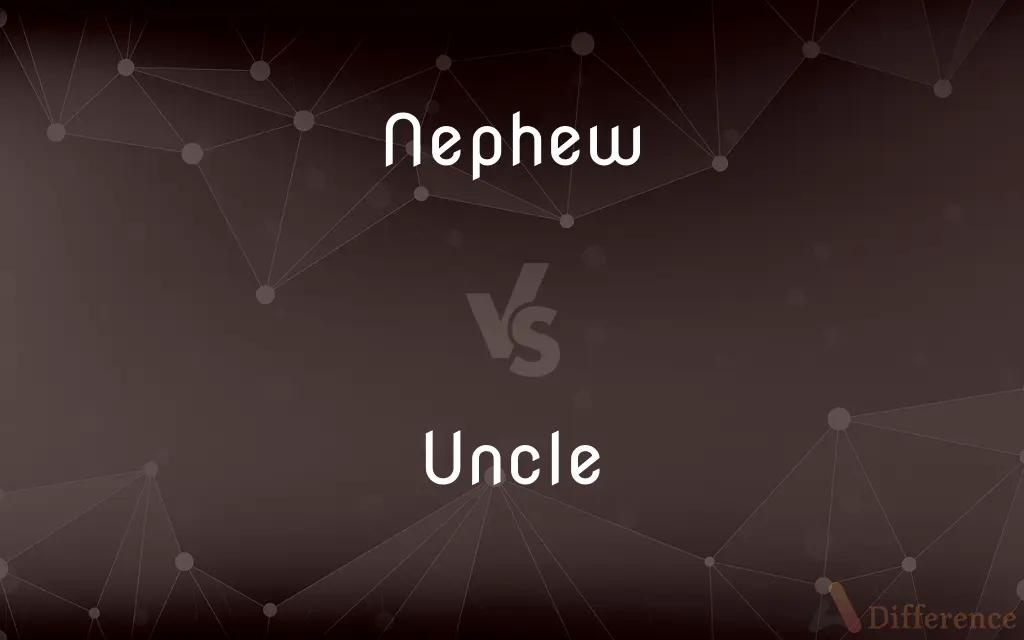Nephew vs. Uncle — What's the Difference?
Edited by Tayyaba Rehman — By Urooj Arif — Updated on April 1, 2024
A nephew is a male relative who is the son of one's sibling or sibling-in-law, while an uncle is a male relative who is the brother of one’s parent or married to one's aunt.

Difference Between Nephew and Uncle
Table of Contents
ADVERTISEMENT
Key Differences
Nephews are male relatives belonging to the generation following one's own, signifying a familial connection through one's siblings or their spouses. This relationship is characterized by the descent from siblings, indicating a vertical shift in the family tree. Uncles, on the other hand, exist in the generation prior to one's own, either by direct blood relation to one's parents or through marriage. This places uncles in a position of generational seniority, often associated with roles of mentorship, guidance, or familial solidarity.
The relationship between a nephew and an uncle is mutually exclusive, defined by their respective positions in the family structure. A person becomes an uncle to his siblings' sons, while those sons become his nephews. This reciprocal relationship underscores the interconnected nature of familial roles, where each person may simultaneously hold multiple positions depending on the relational context.
The roles and expectations of nephews and uncles can vary significantly. Nephews often look up to their uncles for support, advice, or companionship, benefiting from their experiences and wisdom. Uncles, conversely, may take on a protective, nurturing, or advisory role, contributing to the personal development and well-being of their nephews. These relationships can be influenced by cultural norms, personal dynamics, and the individual personalities involved.
Legal and social recognition of these relationships can also impact rights, responsibilities, and familial obligations. In some cultures and legal systems, uncles and nephews may have specific rights or duties towards each other, further emphasizing the importance of these connections within the wider family network.
Understanding the distinctions and dynamics between nephews and uncles offers insight into the complexity of family relationships. These roles carry not only personal and emotional significance but can also reflect broader cultural, social, and legal constructs of family.
ADVERTISEMENT
Comparison Chart
Definition
A male relative, the son of one’s sibling or sibling-in-law.
A male relative, the brother of one’s parent or married to one’s aunt.
Generational Position
Belongs to the generation after one’s own.
Belongs to the generation before one’s own.
Familial Connection
Vertical, indicating descent from siblings.
Horizontal, indicating a lateral extension of the family tree.
Cultural Roles
Often receives guidance and support from uncles.
May provide mentorship, support, or protection to nephews.
Legal/ Social Recognition
Varies by culture and legal system; may include certain familial obligations.
Varies by culture and legal system; can include rights and duties within the family.
Compare with Definitions
Nephew
Recipient of familial affection and guidance.
Our nephew loves spending time at our house.
Uncle
Husband of one's aunt.
Uncle Joe, who's actually my aunt's husband, knows a lot about gardening.
Nephew
Son of one's spouse's sibling.
Our nephews on my wife's side are quite young.
Uncle
A term of endearment or respect for an older male family friend.
We always called him Uncle though he's not related by blood.
Nephew
Part of the next generation in the family.
He's the first nephew in the family, making him the oldest of his cousins.
Uncle
Brother of one's parent.
My uncle will be joining us for the holiday dinner.
Nephew
Son of one's brother or sister.
My nephew is visiting us next weekend.
Uncle
A male figure of support and advice in the family.
He's been like an uncle to me, always there when I need advice.
Nephew
A younger male relative one might mentor.
I've always considered him more of a nephew than a distant cousin.
Uncle
Elder male relative with a familial bond.
My uncles from my mother's side are all musicians.
Nephew
A son of one's brother or sister or of the brother or sister of one's spouse.
Uncle
An uncle is a male relative who is a sibling of a parent or married to a sibling of a parent. Uncles who are related by birth are second-degree relatives.
Nephew
A son of one's sibling, brother-in-law, or sister-in-law; either a son of one's brother (fraternal nephew) or a son of one's sister (sororal nephew).
Uncle
The brother of one's mother or father.
Nephew
A son of one's cousin or cousin-in-law
Uncle
The husband of a sibling of one's mother or father.
Nephew
(archaic) A son of one's child.
Uncle
Used as a form of address for an older man, especially by children.
Nephew
A grandson or grandchild, or remoter lineal descendant.
But if any widow have children or nephews [Rev. Ver. grandchildren].
If naturalists say true that nephews are often liker to their grandfathers than to their fathers.
Uncle
A kindly counselor.
Nephew
A cousin.
Uncle
(Slang) A pawnbroker.
Nephew
The son of a brother or a sister, or of a brother-in-law or sister-in-law.
Uncle
Uncle Uncle Sam.
Nephew
A son of your brother or sister
Uncle
The brother or brother-in-law of one’s parent.
Uncle
The male cousin of one’s parent.
Uncle
(affectionate) Used as a fictive kinship title for a close male friend of one's parent or parents.
Uncle
(euphemistic) Used as a title for the male companion to one's (usually unmarried) parent.
Uncle
(figuratively) A source of advice, encouragement, or help.
Uncle
A pawnbroker.
Uncle
An affectionate term for a man of an older generation than oneself, especially a friend of one's parents, by means of fictive kin.
Uncle
An older African-American male.
Uncle
Any middle-aged or elderly man older than the speaker and/or listener.
Uncle
A cry used to indicate surrender.
Uncle
To address somebody by the term uncle.
Uncle
To act like, or as, an uncle.
Uncle
A pawnbroker.
Uncle
An eldery man; - used chiefly as a kindly or familiar appellation, esp. (Southern U. S.) for a worthy old negro; as, "Uncle Remus."
Plain old uncle as he [Socrates] was, with his great ears, - an immense talker.
Uncle
The brother of your father or mother; the husband of your aunt
Uncle
A source of help and advice and encouragement;
He played uncle to lonely students
Common Curiosities
Are nephews always younger than their uncles?
Typically, yes, since nephews belong to the generation following that of their uncles.
Can nephews and uncles have close relationships?
Yes, nephews and uncles can share close bonds, with uncles often playing significant roles in guidance, support, and mentorship.
Do cultural norms influence nephew-uncle relationships?
Cultural norms and traditions can significantly influence the dynamics, roles, and expectations within nephew-uncle relationships.
Can women be uncles?
Traditionally, the term uncle is gender-specific to males. Female equivalents in the familial context are referred to as aunts.
What responsibilities might uncles have towards their nephews?
Responsibilities can range from providing emotional support and guidance to assuming legal or caregiving roles in certain circumstances.
Do legal systems recognize nephew-uncle relationships?
Legal recognition varies by jurisdiction but can include rights or obligations, particularly in matters of inheritance or guardianship.
How are new nephews welcomed into the family?
New nephews are typically welcomed with joy and celebration, often becoming the focus of familial affection and attention.
What defines a nephew?
A nephew is the son of one’s sibling or sibling-in-law, positioned in the subsequent generation of the family.
How does one become an uncle?
One becomes an uncle by having siblings who have sons or by marriage when their spouse's siblings have sons.
Is the term "uncle" used outside of familial contexts?
Yes, "uncle" can also be a term of endearment or respect for an older male who is not a blood relative but has a close familial-like relationship.
How can uncles impact their nephews' lives?
Uncles can significantly impact their nephews’ lives through mentorship, emotional support, and as role models, contributing to their personal development and life choices.
Can nephew-uncle relationships vary within the same family?
Yes, these relationships can vary widely based on individual personalities, interests, and the overall family dynamics.
Can someone have multiple uncles?
Yes, one can have multiple uncles, including the brothers of both parents and the husbands of one’s aunts.
How do nephews view their uncles?
Nephews may view their uncles as mentors, role models, or sources of fun and adventure, depending on their individual relationships.
What makes the nephew-uncle relationship unique?
The unique blend of familial bond, generational perspectives, and potential for mentorship makes the nephew-uncle relationship particularly special.
Share Your Discovery

Previous Comparison
Affection vs. Effect
Next Comparison
Embezzlement vs. FraudAuthor Spotlight
Written by
Urooj ArifUrooj is a skilled content writer at Ask Difference, known for her exceptional ability to simplify complex topics into engaging and informative content. With a passion for research and a flair for clear, concise writing, she consistently delivers articles that resonate with our diverse audience.
Edited by
Tayyaba RehmanTayyaba Rehman is a distinguished writer, currently serving as a primary contributor to askdifference.com. As a researcher in semantics and etymology, Tayyaba's passion for the complexity of languages and their distinctions has found a perfect home on the platform. Tayyaba delves into the intricacies of language, distinguishing between commonly confused words and phrases, thereby providing clarity for readers worldwide.














































